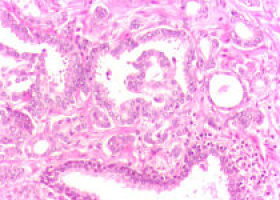
Researchers at Huntsman Cancer Institute (HCI) at the University of Utah (U of U) have identified a potential drug combination to treat uveal melanoma, a type of eye cancer.
Lead author Amanda Truong, trainee in the McMahon Lab at HCI and student at the U of U, explains uveal melanoma patients frequently have changes in genes called GNAQ and GNA11, which are key targets for these drugs.
This study was published in the journal Clinical Cancer Research.
"Uveal melanoma is a relatively rare cancer in general, but the most common cancer of the eye," says Martin McMahon, PhD, senior director of preclinical translation at HCI and professor of dermatology at the U of U.
"Tumours arise from the pigment cells, called melanocytes, which reside within the uvea and give color to the eye."
Although uveal melanoma can be cured when it hasn't spread beyond the eye, this form of melanoma has a propensity for lethal metastasis to the liver.
In 2019, the McMahon lab found that two drugs approved by the Food and Drug Administration called trametinib and hydroxychloroquine worked together to stop tumour growth in pancreatic and other cancers with mutations in the RAS gene.
Truong says, "Because GNAQ and GNA11 mutations activate similar pathways as RAS mutations, we wanted to see whether this combination would work in uveal melanoma as well."
Trametinib is a targeted therapy that blocks MEK proteins, which control cell growth and survival.
Hydroxychloroquine is a drug that inhibits autophagy.
Autophagy is a cellular recycling process that breaks down and destroys old, damaged, or abnormal cell organelles or proteins, and reuses them for other cell functions.
Results of this study showed that using both trametinib and hydroxychloroquine led to more uveal melanoma cell deaths than using the drugs alone.
"Targeted therapies and immunotherapies have worked quite well and improved overall survival for patients with metastatic melanomas arising from the skin. However, these therapies don't typically work for metastatic melanoma of the eye.
There is an urgent need to identify treatments that work for patients with metastatic uveal melanoma," says Truong.
Researchers are working to find more preclinical evidence needed to begin an uveal melanoma clinical trial.
Source: HUNTSMAN CANCER INSTITUTE
The World Cancer Declaration recognises that to make major reductions in premature deaths, innovative education and training opportunities for healthcare workers in all disciplines of cancer control need to improve significantly.
ecancer plays a critical part in improving access to education for medical professionals.
Every day we help doctors, nurses, patients and their advocates to further their knowledge and improve the quality of care. Please make a donation to support our ongoing work.
Thank you for your support.